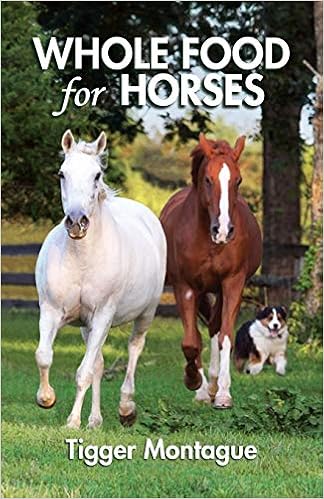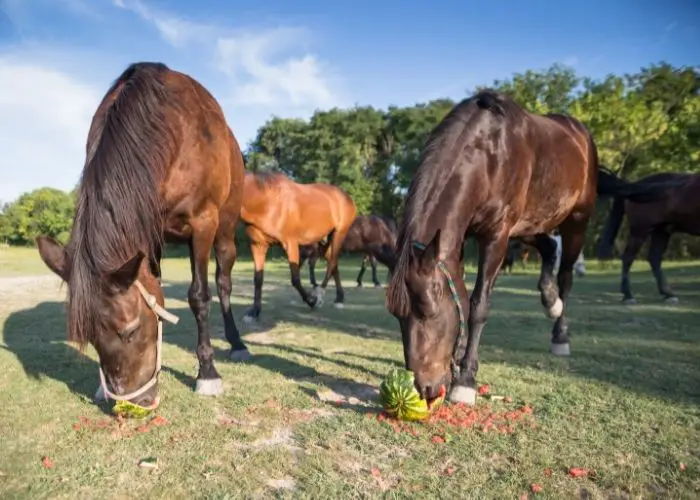Last Updated on January 12, 2023
We’ve all spent years being told that eating our greens is good for us! But does the same apply to our animals – can horses eat broccoli and other vegetables? And is broccoli good for horses to eat?
Most horses enjoy eating a wide range of different fruits and vegetables, and you might be surprised at the variety of healthy snacks they will eat! But we must learn which vegetables are safe for them to eat, to avoid a bad case of indigestion or even poisoning.
Let’s take a look at broccoli and other vegetables and find out if they can be fed to horses.
Can Horses Eat Broccoli?
We can see why you’d think that your horse might enjoy a nibble of broccoli – after all, our equine friends normally enjoy chewing on anything green! But can horses eat broccoli, and is it good for them?
Unfortunately, horses cannot eat broccoli. This is because this vegetable contains a sugar called raffinose. When eaten by horses – and humans – this causes intestinal gas. Whilst this might not cause us any problems, intestinal gas is not a good thing for a horse!
This is because the digestive system of a horse is very sensitive, and gas can easily become trapped. This causes a painful condition called colic.
So, although your horse might enjoy nibbling on broccoli, it is not a good idea to allow him to eat it! Luckily there are plenty of other tasty and healthy treats that your horse will enjoy.
Can Horses Eat Cauliflower?
Sadly, cauliflower is not one of the vegetables that horses can eat! Cauliflower belongs to the same family of vegetables as broccoli – the cruciferous group. Other vegetables in this group include cabbage and kale.
Keep your horse well away from any of this group of vegetables, as they could all cause gastrointestinal problems for your horse. A severe case of colic can be fatal, so it is not worth taking the risk.
How Should Vegetables For Horses Be Prepared?
We all know that horses enjoy eating snacks such as apples and carrots. But should we be preparing these to make them safe to eat?
The level of preparation required depends entirely on the type of fruit or vegetable. Your horse will be able to chew his way through most things, but some tougher vegetables might cause problems such as choking.
Choke is where a piece of food becomes lodged in the esophagus – this is the tube down which food travels from the mouth to the stomach. This normally happens when a horse eats too quickly or does not chew his food enough. Choke is not only very uncomfortable for the horse, but it can be very difficult to resolve.
To avoid choking, make sure that all tough pieces of fruit or vegetables are cut into smaller chunks. This is particularly important for things such as melon rind and large carrots. Older horses, or horses with bad teeth, will also struggle to chew large chunks of fruit or vegetables.
If you are feeding fruits with stones inside them to your horse, such as plums or apricots, make sure that you remove the hard stone first.
Another thing to be aware of is that many fruits and vegetables may have been sprayed with pesticides or other chemicals. If you are not peeling your horse’s healthy snacks before feeding, it would be advisable to wash them first.
Top 6 Fruit And Vegetables Horses Can Eat
So, although your horse should not eat broccoli or other cruciferous vegetables, luckily there are many other healthy snacks they will enjoy! We all know that horses love apples and carrots, but they have adventurous tastes and will eat other types of fruit and vegetables as well.
Why not try making a delicious fruit and vegetable salad for your horse to tuck into on your next picnic trail ride? Here are our top six suggestions for healthy horse snacks!
-
Bananas
Bananas are a great source of potassium for horses, and they can even eat the peel! If your horse hasn’t tried bananas before then start by feeding small chunks by hand to see if he likes the taste.
-
Coconut
Coconuts are an energy-filled snack that will keep your horse at peak performance for hours! The flesh of a coconut is highly nutritious, with potassium, iron, and magnesium. Coconut is also very high in fat and will give your horse a great calorie boost.
Horses cannot eat the husk of the coconut, as it may make them choke. The flesh should be cut into small pieces before feeding.
-
Oranges
Most horses will enjoy eating oranges, but they are not keen on the skin so peel this off first. Oranges contain high levels of vitamin C and are very nutritious for your horse.
-
Pineapple Pieces
Pineapple will need to be carefully prepared before feeding it to your horse, but they will thank you for the effort! You will need to remove the skin and core and cut the pineapple flesh into smaller pieces. Pineapples are a healthy snack, with high levels of vitamin C.
-
Strawberries
Strawberries are packed full of potassium, phosphorous, calcium, and magnesium. They also contain vitamins C, E, and K. All of these nutrients are very beneficial to horses.
These delicious fruits also contain a high level of water and some sugar. Strawberries are a healthy treat, which will hydrate your horse and provide a good source of energy.
-
Watermelon
Horses can eat all parts of the watermelon, including the rind, flesh, and pips. The rind must be fed in small cubes to avoid the risk of choking. Leave the fleshy part-whole, as your horse will enjoy biting into it!
Summary
So, as we have learned, it is not safe to feed broccoli to your horse. In fact, any vegetables in the same family as broccoli, including cauliflower, cabbage, and kale, may cause colic in horses. Luckily, there are many other healthy fruits and vegetables that your horse can eat.
Do you have any questions about horses eating fruit and vegetables? Add a comment below this post and we’ll get back to you! We’d also love to hear your suggestions on other great treat ideas for your horse!
Next up, learn more about How Many Bones In A Horse Skeleton?

Kate Chalmers is a qualified veterinary nurse who has specialized in horse care for the vast majority of her career. She has been around horses since she was a child, starting out riding ponies and helping out at the local stables before going on to college to study Horse Care & Management. She has backed and trained many horses during her lifetime and competed in various equestrian sports at different levels.
After Kate qualified as a veterinary nurse, she provided nursing care to the patients of a large equine veterinary hospital for many years. She then went on to teach horse care and veterinary nursing at one of the top colleges in the country. This has led to an in-depth knowledge of the care needs of horses and their various medical ailments, as well as a life-long passion for educating horse owners on how to provide the best possible care for their four-legged friends.
Kate Chalmers BSc (Hons) CVN, Dip AVN (Equine) Dip HE CVN EVN VN A1 PGCE


